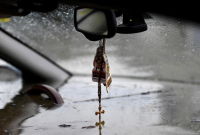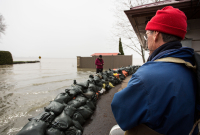Support strong Canadian climate journalism for 2025
Flood levels are gradually dropping in Quebec, particularly in the western part of the province, Public Security Minister Martin Coiteux said Tuesday.
But Coiteux said Quebecers must be realistic and realize things will not return to normal for sometime.
"We have to be patient," he told a news conference. "The situation won't improve overnight. It will happen on a very gradual basis. We have major flooding in several areas and, gradually, the floods will become average and then minor.
"We are headed toward a drop in the water levels which will be complete only at the end of the month. We don't control the weather, so it's conditional on that. But we're headed toward improvement."
So far, the heavy rains and melting snowpack across Quebec have flooded 2,733 residences in Quebec, forcing the evacuation of 1,940 people in 171 municipalities.
The floods have claimed at least one life in the province — Mike Gagnon, 37, whose car ended up in a surging river in the eastern Gaspe region.
Authorities were still searching on Tuesday for a two-year-old girl who disappeared in the same incident.
About 1,650 soldiers are helping municipal and provincial officials in Quebec.
In Ottawa, Prime Minister Justin Trudeau confirmed the federal government will pay for the military-related costs.
"When Canadians are facing natural disasters or serious issues, we pull together, that's who we are," Trudeau said in Ottawa.
"Quebec and Ontario asked for military support and we're happy to give it and of course the federal government will assume all the costs related to support for Quebec and Ontario in these floods."
Despite the easing of various water levels, some people in the Montreal-area community of Deux-Montagnes continued to use canoes to get around Tuesday.
James Taylor borrowed his friend's and said he's acting like a water taxi, bringing people around to check on their homes.
Taylor said he feels a bit guilty that his house is dry and that his neighbours are suffering.
He believes municipality authorities in his town and others could have warned residents earlier that water levels were going to rise in order to give people more time to prepare.
"Local authorities knew what parts of the town were more vulnerable than others," Taylor said, adding residents had to make tough decisions when they banded together to bag sand and rescue people.
"We had to choose what houses to save and which ones to let flood. A group of residents and volunteers shouldn't have had to make that kind of decision."
Another local, Sylvie Briere, was dropped off outside her flooded home by a local man with a canoe.
Even though the water level had reached her front door, Briere was in relatively good spirits.
The floods, she said, have allowed her to get to know her neighbours.
"We have really discovered each other because of this," she said. "We all worked together on this street. When the waters recede were going to have a big street party. A community barbecue."
Premier Philippe Couillard, who attended the Montreal news conference, said he understands the frustration many people are feeling.
"First, I want to tell people affected by the floods...that it's very, very terrible," he said. "I can understand the anxiety, the angst people feel right now. I would feel the same, even some anger, if it were my home being affected the way I've seen certain homes being affected."
Couillard also reiterated his call for Quebecers to donate money to help flood victims.
The provincial government is contributing $500,000 to the Canadian Red Cross fund and the City of Montreal is intending to kick in $250,000.
The premier said he donated money on Tuesday morning.
Quebec's national assembly did not sit Tuesday so that members could stay in their respective ridings an extra day, while Montreal's agglomeration council voted to extend the state of emergency in the area by five days.
"For now, we will proceed as is until Sunday," Mayor Denis Coderre told reporters at city hall, calling the extension a preventive measure.
In Rigaud, Que., defence chief Gen. Jonathan Vance toured flood-stricken areas on Tuesday, taking stock of soldiers' work on the ground, thanking them for their service and listening to any additional concerns.
"Most interesting for me is to hear from the civilian authorities, as I met them in Montreal and now Rigaud, to get a sense of the response, how much more work to be done, do we need to reinforce at all," Vance said.





Comments